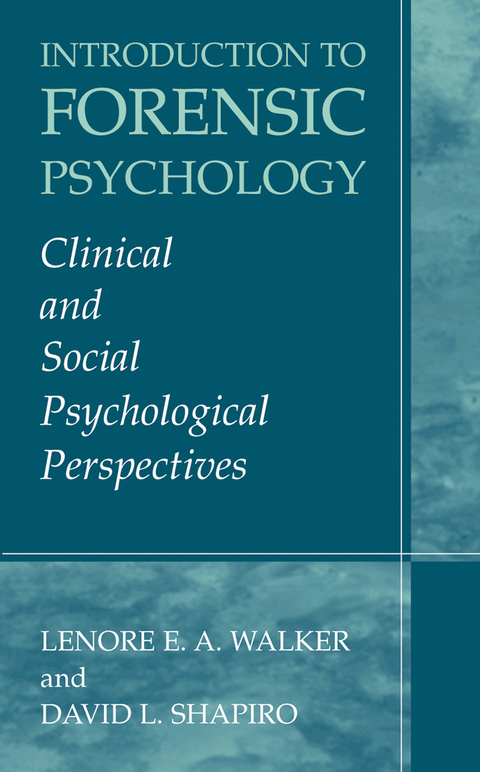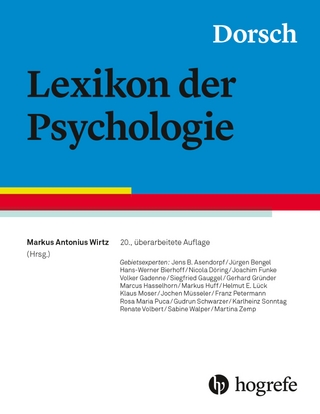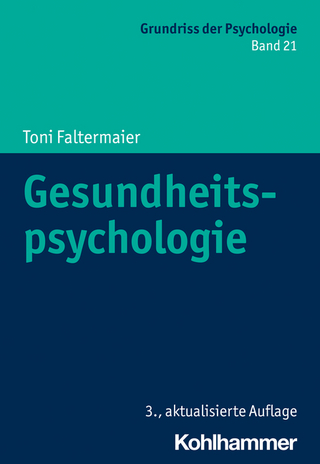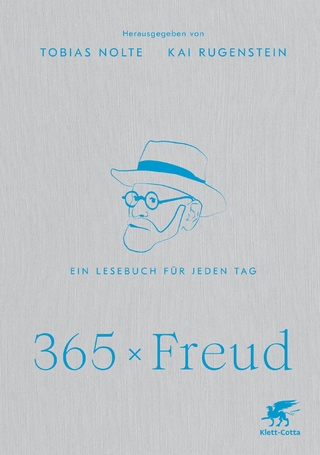
Introduction to Forensic Psychology
Springer-Verlag New York Inc.
978-1-4419-3421-5 (ISBN)
David L. Shapiro was Chief of the PreTrial Forensic Division at St. Elizabeth’s Hospital in Washington D.C., Chief Psychologist for the Maryland Division of Corrections, and in the independent practice of forensic psychology since 1972. He was one of the first psychologists to be awarded the Diplomate in Forensic Psychology and served a term as President of the American Academy of Forensic Psychology. A Fellow of the American Psychological Association, he served on their Ethics Committee as well as the Ethics Committee of the American Board of Forensic Psychology including a term as its Chair. He taught as an Associate Professor for several years at John Jay College of Criminal Justice in NYC and currently is Associate Professor of Psychology at NSU-CPS. Leonore E. Walker is author of 12 previous books including the now classic, The Battered Woman (1979). She was awarded an National Institute of Mental Health research grant that gathered the pioneering information to name "battered woman syndrome" and pioneered its introduction in courts around the country helping juries and judges understand why battered women killed in self-defense and were not mentally ill. Executive Director of the Domestic Violence Institute, Walker has engaged in public policy initiatives, research and training in many countries around the world. She has testified before US Congress and worked with NATO, WHO, PAHO, and other governments to assist in developing public policies to help provide safety for battered women and their children. A Fellow in the American Psychological Association, Walker served a term on the Board of Directors and Council of Representatives, chaired the Child Abuse Policy Committee and the Presidential Task Force on Violence and the Family, and was President of several divisions including Society for the Psychology of Women, Psychologists in Independent Practice of Psychology, and Media Psychology. She currently has an independent practice offorensic psychology and is Professor and Coordinator of the Forensic Psychology Concentration in NSU-CPS.
Section I What is Forensic Psychology?.- 1: Introduction to Forensic Psychology.- 2: Models of Legal Systems.- 3: Admissibility of Expert Testimony.- Section II Understanding the Criminal Mind.- 4: Criminal Responsibility.- 5: Competency to Stand Trial.- 6: Self-Defense and Syndrome Testimony.- 7: Clinical Assessment in Forensic Settings.- 8: Psychological Interventions in Forensic Settings.- Section III Can Psychologists Measure Pain and Suffering?.- 9: Civil Law and Personal Injury.- 10: Involuntary Commitment and Other Civil Liberties.- Section IV Family Law and Fitness to Parent.- 11: Marriage and Divorce.- 12: Access to, and Protection of, Children.- 13: Protection of Abused Children, the Mentally and Physically Challenged, and the Elderly.- 14: Reproductive Rights and the Law.- Section V Juvenile Justice.- 15: Delinquency.- 16: School Violence.- 17: Legal Rights of Children.- Section VI Legal Consultation Based on Social Psychology.- 18: Discrimination and Sexual Harassment.- 19: Eyewitness Identification.- 20: Jury Selection and Trial Consultation.- Section VII Practical Tips for Forensic Psychology Experts.- 21: Forensic Experts and Attorneys: Communication Process.- 22: Risk Management in Forensic Psychology Practice.- Case Citations.- Selected Readings.
| Erscheint lt. Verlag | 1.12.2010 |
|---|---|
| Zusatzinfo | IX, 430 p. |
| Verlagsort | New York, NY |
| Sprache | englisch |
| Maße | 155 x 235 mm |
| Themenwelt | Geisteswissenschaften ► Psychologie ► Allgemeines / Lexika |
| Geisteswissenschaften ► Psychologie ► Klinische Psychologie | |
| Medizin / Pharmazie ► Medizinische Fachgebiete ► Psychiatrie / Psychotherapie | |
| Sozialwissenschaften ► Soziologie | |
| ISBN-10 | 1-4419-3421-9 / 1441934219 |
| ISBN-13 | 978-1-4419-3421-5 / 9781441934215 |
| Zustand | Neuware |
| Haben Sie eine Frage zum Produkt? |
aus dem Bereich


